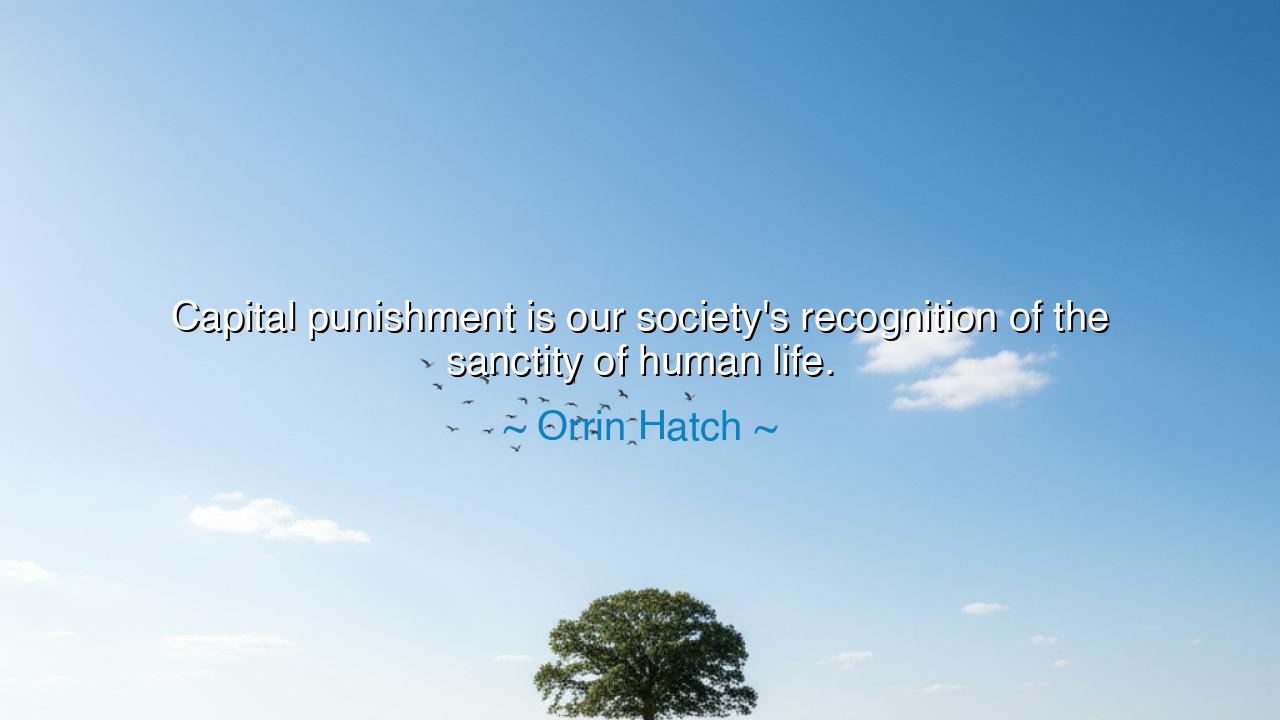
Capital punishment is our society's recognition of the sanctity






Orrin Hatch, a voice forged in the crucible of law and governance, once declared: “Capital punishment is our society’s recognition of the sanctity of human life.” At first glance, the words seem paradoxical: how can the deliberate ending of one life affirm the sacredness of life itself? Yet when examined with the eyes of history and morality, they reveal a vision as old as civilization itself—that justice sometimes demands the gravest consequence, not out of cruelty, but out of reverence for the value of life taken unjustly.
The meaning of his words lies in the weight of proportion. To Hatch, when society punishes murder with death, it is not because it disregards life, but because it holds life as sacred beyond measure. The murderer, in stripping life from another, has violated the highest order of human existence. By enforcing the severest penalty, society declares that to take innocent blood is to commit a crime so monstrous that it forfeits one’s own claim to live freely among others. Thus, capital punishment becomes a statement: life is holy, and its unlawful destruction demands a reckoning.
History offers vivid examples of this belief. In ancient Babylon, the Code of Hammurabi declared, “an eye for an eye, a tooth for a tooth.” While to modern ears it may sound harsh, it was in its time a profound recognition of equality: the life of the victim was not to be ignored, nor could the crime be brushed aside. The punishment mirrored the offense, declaring that the loss of life was the gravest wound to the order of society. To ignore it would have been to say that life had little worth. To answer it, even with death, was to proclaim its sanctity.
Consider also the Nuremberg Trials after World War II. Leaders of the Nazi regime stood accused of crimes against humanity: genocide, torture, mass slaughter. The court could have imprisoned them for life, but many were instead condemned to death. Why? Because the enormity of their crimes required the world to affirm, before all nations, that human life is sacred, and those who desecrate it on such a scale cannot be permitted to escape the ultimate judgment. The execution of those men was less about vengeance than about a universal recognition: life, when taken unjustly, cries out for justice.
Yet, Hatch’s statement is not without its critics. Some argue that taking life, even in justice, contradicts the very idea of its sanctity. They say mercy, not execution, shows the higher reverence for human worth. But even in this debate, the central truth remains: the value of life is the cornerstone of the argument. Whether through mercy or punishment, both sides wrestle with the same eternal question: how shall a society uphold the sacredness of human life when it has been defiled? Hatch’s answer is clear—through the solemn power of justice wielded in capital punishment.
The lesson for us, then, is not only about law, but about values. We must ask ourselves: how deeply do we honor life? Do we defend the innocent, protect the vulnerable, and honor the dignity of every soul? Hatch’s words challenge us to see that justice, however it is rendered, is not vengeance but a declaration: human life is holy, and to destroy it unjustly is to invite the gravest consequence. Whether one agrees with his conclusion or not, the principle is undeniable: a society that refuses to confront evil undermines its claim to cherish life.
Practical action flows from this truth. Stand firm in defending the dignity of life at every level—by protecting the weak, by advocating for justice, by opposing violence in all its forms. If you support capital punishment, let it be not out of cruelty but out of reverence, and let it be exercised with solemn caution. If you oppose it, let your opposition be equally rooted in the sanctity of human life, and show mercy as a higher expression of that truth. In either case, never allow indifference to reign—for indifference is the true enemy of sanctity.
Thus, Orrin Hatch’s words endure: “Capital punishment is our society’s recognition of the sanctity of human life.” They remind us that justice is not only about punishment, but about values, and that how a people responds to the crime of murder reveals what they truly believe about life itself. And whether by judgment or by mercy, the calling remains the same: to honor life as sacred, to defend it with courage, and to uphold its dignity in the face of all who would profane it.






AAdministratorAdministrator
Welcome, honored guests. Please leave a comment, we will respond soon